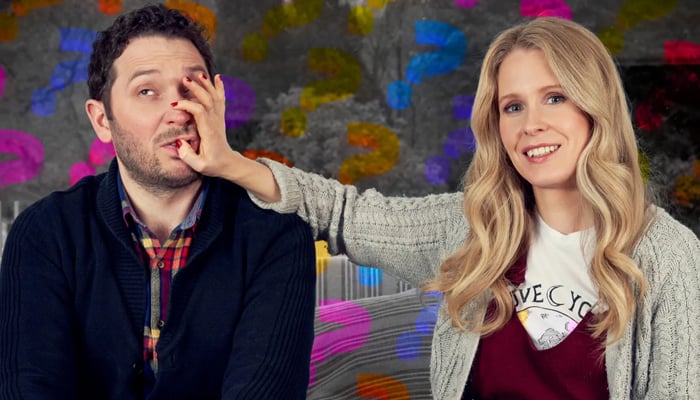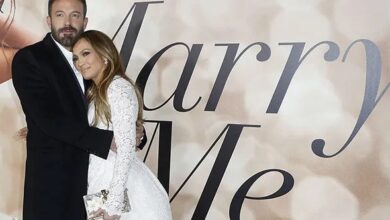Lucy Beaumont Exposes the Industry Predators Who Stopped Her Career From Growing

Lucy Beaumont, a well-known figure in the British comedy scene, has shed light on the darker side of the industry.
Specifically addressing the challenges posed by predatory men who, according to her, have been holding women back in their careers.
Her recent revelations have caused a stir, particularly in the context of her high-profile divorce from comedian Jon Richardson.
On Tuesday, news of Beaumont’s divorce settlement made headlines, with the comedian reportedly set to receive a payout of over £1.625 million.
The substantial figure is tied to her share in a company she co-ran with her now ex-husband, which Richardson had allegedly withheld during their marriage.
This financial dispute, now resolved, seems to mark the beginning of a new chapter for Beaumont, who is not only reclaiming her financial rights but also speaking out on the broader issues women face in the comedy circuit.
Beaumont has opened up about experiencing multiple instances of inappropriate behavior early in her career, bringing attention to what she describes as a pervasive problem of male predators in the comedy world.
In a recent interview, she expressed her frustration, sharing that she had witnessed the careers of many women being held back by such individuals.
“I thought for a while it was the same five or six people,” Beaumont explained. “And now it’s not – I could name you 10 or 15 because of course, people talk. Comedy has the biggest gossips ever.”
Her comments reveal the extent to which inappropriate behavior has been normalized in some corners of the industry.
Beaumont described the comedy scene as one that attracts a wide array of personalities, from the brilliant to the troubled, but also noted that fame can sometimes amplify problematic behaviors in men who have long suppressed their issues.
“It attracts such interesting people, but it also attracts predatory men who are really messed up and sexually have been repressed for years. They get a bit of fame and display these behaviors,” she added.
Her decision to speak up comes in the wake of her exit from the joint business venture she shared with Richardson, a move that symbolically mirrors her departure from the constraints of a career and personal life that may have been impacted by such predatory figures.
Although Beaumont’s divorce settlement is front-page news, it is her candid discussion of the industry’s toxic culture that has truly resonated with many.
Beaumont’s accusations go beyond the individual level. She pointed fingers at the broader system, including talent agents and media channels, for perpetuating a culture of silence around these problematic men.
Despite widespread awareness of certain individuals’ conduct, she claims little is being done to address the issue.
“It just gets covered up. Their agents know and the channels know and nobody seems to be doing anything about it,” she lamented, echoing the frustrations of many women in male-dominated industries where power imbalances allow for unchecked bad behavior.
Beaumont’s public statements coincide with a wider conversation about harassment and abuse within various entertainment sectors.
Over the past few years, several industries have faced reckonings about the mistreatment of women and minorities, with movements like #MeToo sparking necessary conversations around these issues.
However, Beaumont’s insights suggest that comedy, often perceived as a progressive and outspoken industry, still has a long way to go in addressing its own demons.
While Beaumont did not name specific individuals, she did mention the existence of an informal “blacklist” within the industry, reportedly containing the names of at least 15 people accused of inappropriate conduct.
The knowledge of these figures, she said, is well-known among comedians, but the fear of retaliation or professional repercussions has kept many from speaking out.
Beaumont’s willingness to discuss these issues reflects her desire for change within the industry, though she admits that addressing the problem is far from simple.
She alluded to the fact that many female comedians and performers remain silenced, either due to legal constraints or the fear of damaging their careers.
In a podcast appearance last year, Beaumont discussed these issues in more detail, expressing how frustrating it has been for her to hold back from speaking out sooner.
“I have wanted to scream it to the world before,” she said, indicating that she has long been aware of the toxicity present in the industry but felt restricted by industry norms and unwritten rules of silence.
Beaumont’s recent statements have sparked renewed calls for greater accountability in the comedy world. As more voices like hers emerge, there is hope that the industry will confront its dark side and create a safer, more equitable space for all performers.
For now, Beaumont’s bravery in speaking out marks an important step in the ongoing battle against predatory behavior in entertainment, offering solidarity to other women who have been affected and demanding that those in positions of power take real action.






